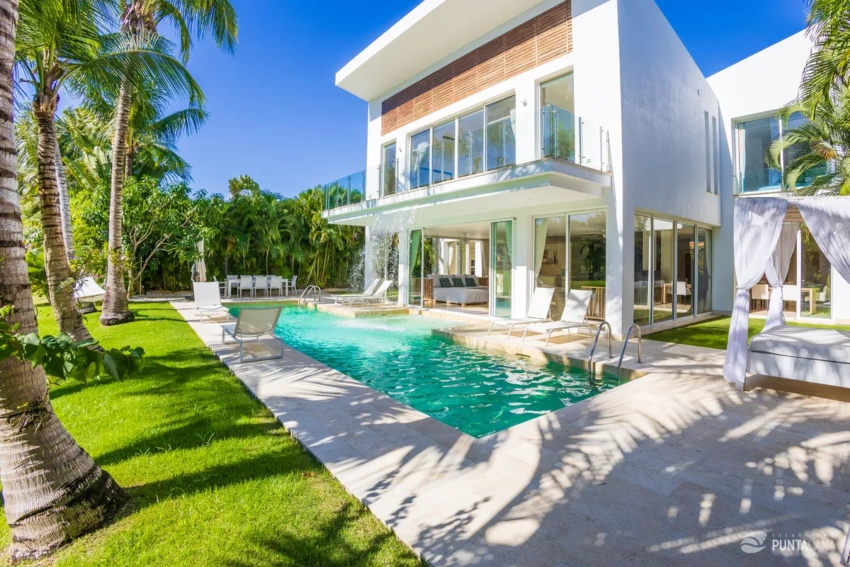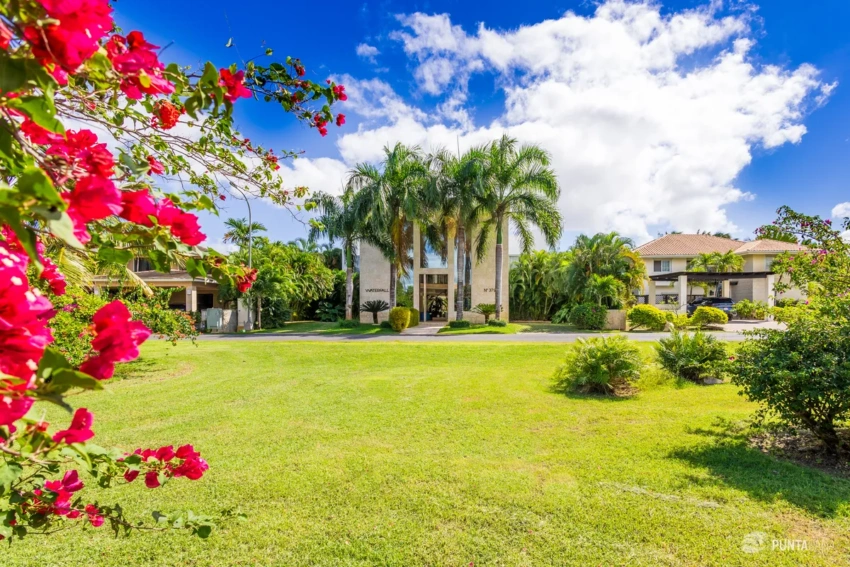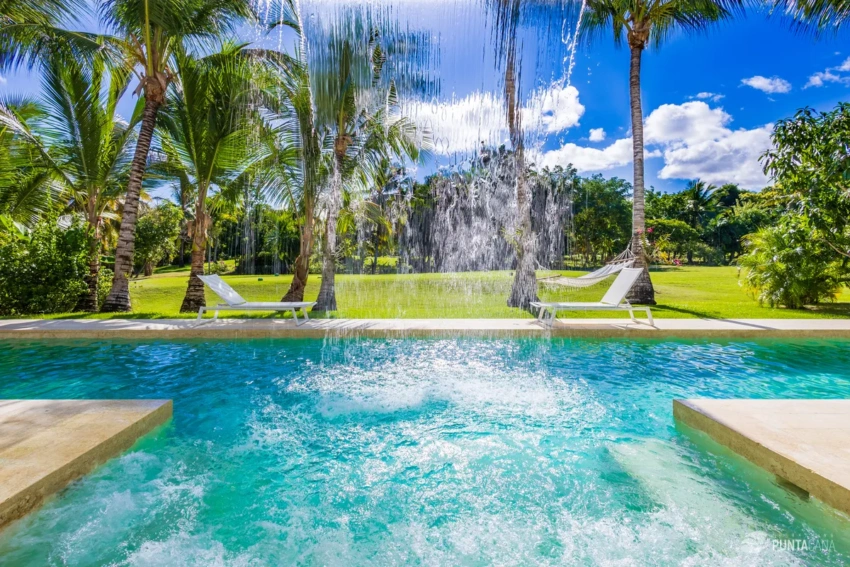Is It Safe to Book a Villa in the Dominican Republic Online?
Understanding the Safety of Online Bookings

Is It Safe to Book a Villa in the Dominican Republic Online?
As the digital world expands, booking accommodations online has become increasingly popular. However, this convenience comes with its own set of safety concerns, especially when it involves securing a villa in exotic locations like the Dominican Republic.
1. Common Online Booking Concerns
When booking villas online, there are a few common concerns that travelers typically face. One of the primary issues is the risk of scams and fraud. With the rise of sophisticated phishing techniques, potential travelers may find themselves prey to fraudulent listings that appear genuine. These scams often result in financial loss and, more concerning, can leave travelers stranded without accommodation upon arrival.
Data security is another critical concern. When booking online, users often provide sensitive information such as credit card details, personal identification, and contact information. This data, if not handled securely, can be exposed to cybercriminals, leading to identity theft or unauthorized transactions. It is essential for travelers to ensure that the booking website uses encryption and has robust security measures in place to protect user data.
In addition to these, concerns about misrepresentation of villas can cause travelers to hesitate. Listings might showcase stunning images and descriptions that do not accurately reflect the actual property. This can lead to disappointment and a compromised vacation experience.
2. Reputable Booking Platforms
To mitigate the risks associated with online villa bookings, utilizing reputable booking platforms is crucial. Some well-known and trusted platforms include Airbnb, Vrbo, and Booking.com. These platforms offer a layer of security and assurance, as they generally have stringent verification processes for property listings and provide customer support to address any issues that may arise.
Platforms like Airbnb, for instance, have implemented a comprehensive review system and host verification processes to ensure that properties listed are legitimate. Vrbo offers features such as secure payments and cancellation protection, adding an extra layer of safety. Meanwhile, Booking.com provides a vast selection of villas with detailed user reviews and secure payment options.
Comparison of Reputable Booking Platforms
| Platform | Security Features | User Reviews | Cancellation Policies |
|---|---|---|---|
| Airbnb | Host verification, secure payments | Extensive reviews | Flexible options |
| Vrbo | Fraud protection, secure payments | Detailed reviews | Moderate to strict |
| Booking.com | Secure transactions, customer support | Varied reviews | Varied policies |
When choosing a platform, it is advisable to consider the features that are most important to you, such as the extent of fraud protection or the flexibility of cancellation policies.
3. Reading Reviews and Ratings
Reviews and ratings are instrumental in assessing the credibility and safety of a villa rental. They offer firsthand accounts from previous guests, providing insights into the property’s condition, the accuracy of the listing, and the responsiveness of the host. By paying attention to both positive and negative reviews, you can better gauge the reliability of a villa.
It is beneficial to look for patterns in reviews. Consistent praise for cleanliness and location, for example, can indicate a well-maintained and conveniently situated property. Conversely, recurring complaints about misleading images or unresponsive hosts might be red flags.
In conclusion, while booking a villa in the Dominican Republic online can be safe and rewarding, it requires diligence and attention to detail. By addressing common concerns, selecting reputable platforms, and leveraging reviews and ratings, you can enhance your booking experience and ensure a secure and enjoyable stay.
Evaluating the Safety of the Dominican Republic as a Destination
When planning a trip, understanding the safety dynamics of your destination is crucial. The Dominican Republic, with its stunning beaches and vibrant culture, is a popular choice for travelers. However, assessing the safety of this Caribbean gem is essential to ensure a worry-free vacation.
1. Current Travel Advisories
Staying updated on travel advisories is imperative for any traveler heading to the Dominican Republic. Agencies such as the U.S. Department of State provide regular updates on safety conditions. As of recent advisories, the Dominican Republic is generally considered safe for tourists, with most visits being incident-free. However, travelers are advised to exercise increased caution due to potential petty crime in urban areas.
Before your trip, check the latest travel advisory specific to the Dominican Republic on the official U.S. Department of State’s website. This ensures you are informed about any new developments that may affect your travel plans.
2. Popular Tourist Areas and Their Safety

Villa Waterfall, Punta Cana, Cocotal – Available for booking
Tourist hotspots such as Punta Cana, Puerto Plata, and La Romana are renowned for their safety and welcoming atmosphere. These areas have well-established tourist infrastructure, including resorts and private villas, which prioritize guest security. The local police have a strong presence to ensure peace and safety for visitors.
Punta Cana, for instance, is a popular destination known for its luxurious all-inclusive resorts and private villas like the stunning Villa Waterfall. This area is particularly safe, with gated communities and 24/7 security in many accommodations. While exploring these areas, it’s advisable to stay within tourist zones and avoid carrying large sums of money.
3. Local Laws and Customs
Understanding the local laws and customs of the Dominican Republic is vital for ensuring a smooth and respectful trip. The country operates under a democratic government, with laws similar to those in the U.S. However, there are unique customs and regulations to be mindful of.
For example, it’s essential to carry a valid ID at all times, as random checks by authorities are not uncommon. In terms of customs, embracing the local culture can enhance your travel experience. Dominicans are known for their warmth and hospitality, and showing respect for their traditions is reciprocated with kindness.
Familiarizing yourself with these aspects not only ensures compliance with local regulations but also enriches your overall travel experience in this beautiful country.
Ensuring a Secure Online Booking Experience
In today’s digital age, securing your online transactions is of paramount importance, especially when booking luxury accommodations like villas in the Dominican Republic. Implementing key strategies can significantly enhance your safety and peace of mind during the booking process.
 Villa Waterfall, Punta Cana, Cocotal – Available for booking
Villa Waterfall, Punta Cana, Cocotal – Available for booking
1. Using Secure Payment Methods
Opting for secure payment methods is crucial in protecting your financial data from potential breaches and fraud. Understanding which options offer the best security can be a game-changer for online transactions.
- Credit Cards: Using credit cards often provides an extra layer of security since most credit card companies offer fraud protection and dispute resolution. Always ensure that the transaction is conducted over a secure, encrypted connection, denoted by ‘https://’ in the URL.
- PayPal: This platform is renowned for its robust security features, including no direct access to your bank account and buyer protection policies. PayPal can act as a middleman, keeping your financial information safe from the vendor.
- Escrow Services: Some booking platforms offer escrow services where the payment is held by a third party until both parties are satisfied with the transaction. This can mitigate risks associated with fraudulent listings.
In any case, avoid direct bank transfers or wiring money, as these methods offer little in terms of fraud protection or recourse if things go awry.
2. Verifying Villa Listings
The legitimacy of a villa listing can often be verified through diligent research and critical analysis. This step is essential to avoid scams and ensure that the villa you book meets your expectations.
- Check for Consistent Information: Look for consistency across multiple sources such as the villa’s own website, listing on booking platforms, and social media profiles. Discrepancies might indicate a suspicious listing.
- Google Image Search: Use a reverse image search to check if the villa images have been lifted from other listings or websites. This can help you identify fraudulent listings that may have copied images from legitimate properties.
- Contact Previous Guests: If possible, reach out to previous guests who have reviewed the villa. They can provide firsthand insight into their experiences and the villa’s authenticity.
3. Direct Communication with Villa Owners
Establishing direct communication with villa owners or managers can provide much-needed transparency and assurance about your booking. This step can also help you personalize your experience and clarify any doubts.
- Ask Questions: Inquire about the villa’s amenities, nearby attractions, and any specific concerns you might have. Genuine owners will be more than willing to provide detailed responses.
- Video Tours: Request a live video tour of the villa. This can help confirm the property’s condition and features, and also give you a sense of the owner’s willingness to assist.
- Verify Contact Information: Ensure the contact details provided are legitimate. Cross-check phone numbers and email addresses with official websites or trusted booking platforms.
By following these guidelines, you can significantly reduce the risks associated with online bookings and enjoy a secure and hassle-free experience when reserving your dream villa in the Dominican Republic.
Additional Considerations for Booking Villas
When planning a luxury villa vacation in the Dominican Republic, it’s crucial to consider several additional aspects to ensure a smooth and enjoyable experience. These considerations can save time, money, and potential frustration, enhancing your overall travel experience.
 Villa Waterfall, Punta Cana, Cocotal – Available for booking
Villa Waterfall, Punta Cana, Cocotal – Available for booking
1. Understanding Cancellation Policies
Navigating through the fine print of cancellation policies is essential when booking a villa. Policies can vary significantly from one property to another, impacting your flexibility and financial commitments.
Many villas offer a non-refundable payment policy, especially for peak seasons. Understanding these terms helps in making informed decisions. Some luxury villas might provide a partial refund if cancellations are made within a certain period before arrival. It’s advisable to look for properties that offer free cancellation up to a few weeks before your stay, providing a safety net in case of unforeseen changes.
Comparison of Cancellation Policies
| Booking Platform | Free Cancellation Period | Refund Policy | Booking Fee |
|---|---|---|---|
| Airbnb | Up to 48 hours after booking | Full refund before specified date | Varies by host |
| VRBO | 14 days before check-in | Partial refund (50%) | Service fee applies |
| Booking.com | Varies by property | Full or partial, depending on property | No booking fees |
Examining the cancellation policies of different platforms and villas can help you select the best option that aligns with your travel plans and contingencies.
2. Assessing Amenities and Services
The allure of booking a villa often lies in the promise of exclusive amenities and personalized services. However, it’s vital to carefully assess what is genuinely offered to avoid any potential disappointments upon arrival.
Start by verifying the essential amenities like Wi-Fi, air conditioning, and kitchen facilities, which are crucial for a comfortable stay. Luxury villas often boast additional perks such as private pools, housekeeping services, and chef services. Check if these services are included in the rental price or require additional fees. Understanding these details upfront will ensure that the villa meets your expectations and provides the desired level of luxury.
Moreover, consider the property’s location and proximity to local attractions and essential services like grocery stores or emergency services. A convenient location can significantly enhance your holiday experience, offering both tranquility and easy access to the vibrant local culture.
3. Considering Travel Insurance
Travel insurance is a vital component of securing your travel plans, especially when booking high-value accommodations like luxury villas in the Dominican Republic.
Comprehensive travel insurance can cover unexpected events such as trip cancellations, medical emergencies, or even disruptions caused by natural disasters. This added layer of protection can provide peace of mind, allowing you to enjoy your vacation worry-free.
When selecting a travel insurance policy, ensure it covers cancellation protection, medical expenses, and personal liability. Additionally, check if the policy covers activities planned during your stay, such as water sports or adventure tours, which may require specific coverage.
By considering these additional factors, you can enhance your booking experience, ensuring a luxurious and secure stay in the beautiful Dominican Republic.
Frequently Asked Questions
Is it generally safe to book a villa in the Dominican Republic online?
Yes, it is generally safe to book a villa online in the Dominican Republic. However, it is important to use reputable booking platforms and verify the authenticity of the listing before making any payment. Look for platforms with good customer reviews and a secure payment system.
How can I verify the legitimacy of a villa listing online?
To verify the legitimacy of a villa listing, you should check reviews from previous guests, confirm the listing details on multiple sites if available, and contact the property owner or manager directly to ask questions. Using well-known booking platforms with verification processes can also help ensure legitimacy.
What are some red flags to watch out for when booking a villa online?
Red flags include listings with very few or no reviews, requests for payment through unsecured methods, or communication from the host that seems unprofessional or evasive. If the price seems too good to be true, it might be worth investigating further.
Are there any secure payment methods I should use?
Yes, always use secure payment methods such as credit cards or trusted payment platforms like PayPal. Avoid wire transfers or direct bank transfers to unknown parties, as these can be more difficult to resolve in case of a dispute.
What should I do if I encounter a scam while booking a villa?
If you suspect a scam, immediately report it to the booking platform and your bank. Document all communications and transactions to aid in any investigations. Consider contacting local authorities if necessary.
How important is travel insurance when booking a villa online?
Travel insurance is very important as it can provide coverage for unexpected events such as trip cancellations, medical emergencies, or property issues. Always review your insurance policy to understand what is covered.
Can booking a villa through a travel agency be safer than booking online directly?
Booking through a reputable travel agency can offer additional security as they often have established connections and can handle any issues that arise. However, this may come with additional fees.
What should I consider when choosing a booking platform for villas?
Consider the platform’s reputation, the security of its payment system, customer service options, and the availability of customer reviews. Platforms with a strong record of protecting their users’ interests are preferable.
Will I need to provide personal information when booking a villa online?
Yes, you will need to provide personal information such as your name, contact information, and payment details. Ensure that the platform you use has robust data protection policies and secure data handling practices.
Are there any legal precautions I should take when booking a villa in the Dominican Republic?
It is advisable to read the terms and conditions carefully, ensure you have a written agreement, and understand the cancellation and refund policies. Consulting with a legal professional for detailed advice can also be helpful if you have specific concerns.
Updated on: . Author:
